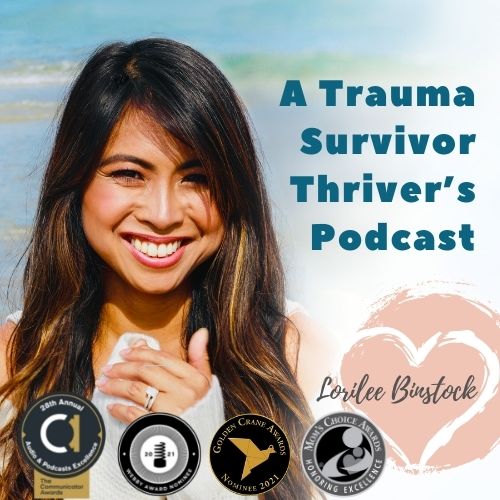
38.6K
Downloads
159
Episodes
In this podcast series, I’ll share my experiences as a trauma survivor and my journey through recovery. With the help of mental health advocates and experts, we will discuss ways to dismantle the stigma around mental illness to promote mental wellness.
In this podcast series, I’ll share my experiences as a trauma survivor and my journey through recovery. With the help of mental health advocates and experts, we will discuss ways to dismantle the stigma around mental illness to promote mental wellness.
Episodes
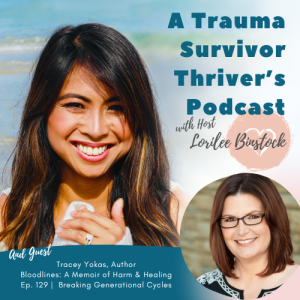
Thursday Oct 10, 2024
Breaking Generational Cycles
Thursday Oct 10, 2024
Thursday Oct 10, 2024
In this week’s episode, Lorilee Binstock interviews Tracey Yokas, Author of “Bloodlines: A Memoir of Harm and Healing.” Tracey talks about her journey as a parent of a child experiencing a mental health crisis and how it has impacted their family. She also discusses the challenges of dealing with eating disorders and the importance of self-care for parents. Tracey focuses on generational trauma and the patterns that get passed down from generation to generation. She emphasizes the need for parents to seek professional help and work on their own healing and understanding of their own patterns and behaviors.
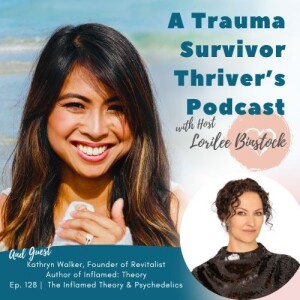
Thursday Oct 03, 2024
The Inflamed Theory
Thursday Oct 03, 2024
Thursday Oct 03, 2024
In this episode of A Trauma Survivor Thriver's podcast, host Lorilee Binstock interviews Kathryn Walker, CEO of Revitalist Lifestyle and Wellness and author of "Inflamed:Theory." Kathryn is a strong advocate for psychedelic medicine and recently earned a second master's degree in psychiatric nursing. Her book, "Inflamed Theory", examines the link between inflammation and mental health. She discusses her theory, which is rooted in Newton's laws of physics, and breaks down the three main brain networks involved in mental health and addiction. Kathryn focuses on the concept of vulnerability and how psychedelics can act as a catalyst to help individuals sit with their emotions and process their trauma. Kathryn explains that when the body experiences stress or trauma, the response can be hyper or hypo-inflated. This leads to imbalanced levels of cortisol and serotonin, which can contribute to inflammation in the body. The use of ketamine and psychedelics can help regulate these levels and reduce inflammation. The example of shaking during a psychedelic experience is given as an example of releasing trauma from the body. Kathryn also discusses other options for decreasing inflammation, such as functional mushroom supplements.
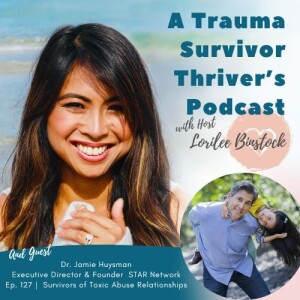
Thursday Sep 26, 2024
Survivors of Toxic Abusive Relationships
Thursday Sep 26, 2024
Thursday Sep 26, 2024
I speak with Dr. Jamie Huysman, the founder of the Toxic Abusive Relationship (TAR) Network and soon to be the Star Network Foundation. We discuss toxic relationships and how to recognize red flags, set boundaries, and take care of oneself. He discusses the foundation’s new “Star Survivors of Toxic Relationships” initiative and how content creators can become socially responsible by providing trigger warnings and resources for their audience. He also encourages anyone interested to join the foundation and help spread awareness and healing. We also discuss the recent shooting at a Georgia school, and the need for accountability in parenting. He also discusses how the United States is unique in its mass shooting capabilities and the need for attachment disorder education in parenting programs. He introduces TAR ANON, a free program that offers support and education for those in toxic relationships. The program aims to help people find emotional regulation and authenticity through group meetings
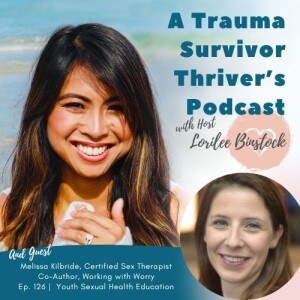
Thursday Sep 19, 2024
Youth Sexual Health Education
Thursday Sep 19, 2024
Thursday Sep 19, 2024
In the first episode of season 6 of "A Trauma Survivor Thriver's Podcast," host Lorilee Binstock welcomes Melissa Kilbride, a Certified Sex Therapist, to discuss the importance of early sexual health education and consent. Melissa shares her eclectic therapeutic approach, which includes cognitive behavioral interventions and mindfulness, and talks about her work with anxious children. They discuss the importance of open conversations about sexual health from a young age to prevent trauma and promote healthy relationships. Lorilee and Melissa also touch on generational differences in discussing sexual health, the necessity of addressing sexting and pornography, and ensuring safe use of technology for children. Melissa emphasizes that it's never too late to start these essential conversations, providing practical advice for parents along the way.
For More Info on Melissa, visit mlktherapy.com
Instagram: askable_mama
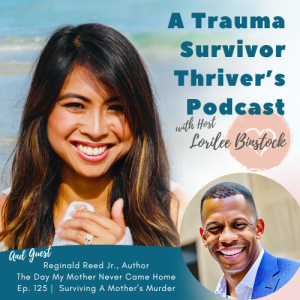
Thursday May 16, 2024
Surviving A Mother's Murder
Thursday May 16, 2024
Thursday May 16, 2024
Thank you for joining us for a A Trauma Survivor Thriver’s Podcast now on Mental Health News Radio Network. This podcast is also available wherever you get your podcasts but I do suggest checking out Mental Health News Radio Network to find all your podcasts related to mental health.
Today’s guest is Reginald Reed, Author of The Day My Mother Never Came Home" A Memoir that plays out more like a true crime story. Reginald is also an accomplished professional in the Pharmaceutical industry. He holds a Master's Degree in Business and Global Marketing. He is also an advocate for mental health within the black community.
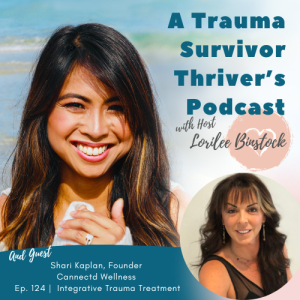
Thursday May 09, 2024
Integrative Trauma Treatment
Thursday May 09, 2024
Thursday May 09, 2024
Thank you for joining us for a A Trauma Survivor Thriver’s Podcast now on Mental Health News Radio Network. This podcast is also available wherever you get your podcasts but I do suggest checking out Mental Health News Radio Network to find all your podcasts related to mental health.
Today’s guest is Shari Kaplan, an expert in integrative mental healthcare and plant medicine and founder of Cannectd. Shari emphasizes blending traditional therapy with cutting-edge protocols like plant medicines, ketamine therapy, breathwork, and somatic practices. She is also the founder of the Can't Tell Foundation, which provides access to integrative care for those affected by trauma, PTSD, anxiety, depression and more.

Thursday May 02, 2024
Toxic Abuse Relationships
Thursday May 02, 2024
Thursday May 02, 2024
Thank you for joining us for a A Trauma Survivor Thriver’s Podcast now on Mental Health News Radio Network. This podcast is also available wherever you get your podcasts but I do suggest checking out Mental Health News Radio Network to find all your podcasts related to mental health.
Today’s guest is James Huysman, Founder of the Toxic Abuse Relationship Network, a 501(c)(3) charity dedicated to bringing worldwide awareness and treatment to those whose emotional reality has been distorted by narcissistic abuse. Dr. Jamie has 30 years of experience in healthcare and media. He has developed celebrity foundations serving millions. His trauma informed clinical background has driven his passion to deal with this public health disaster in honor of his child and all children.
TAR Resources:
This presentation will help you meet and greet the Stress Response to develop an approach and vital prevention force field to the slippery slopes of burnout and Compassion Fatigue.
REGISTER FOR FREE EVENT!
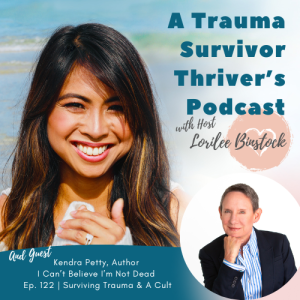
Thursday Apr 25, 2024
Surviving Trauma & A Cult
Thursday Apr 25, 2024
Thursday Apr 25, 2024
Thank you for joining us for a A Trauma Survivor Thriver’s Podcast now on Mental Health News Radio Network. This podcast is also available wherever you get your podcasts but I do suggest checking out Mental Health News Radio Network to find all your podcasts related to mental health.
Today’s guest is Kendra Petty, Author of the True Crime Memoir, I Can't Believe I'm Not Dead: Escaping Abuse,A Cult, Attempted Murder and Other Insanities... A Story That Cannot Be True But it is. Far from your typical “memoir,” this is both an inspirational story of resilience, grit, and perseverance, as well as a jaw-dropping thriller that proves that some lives really are stranger than fiction.
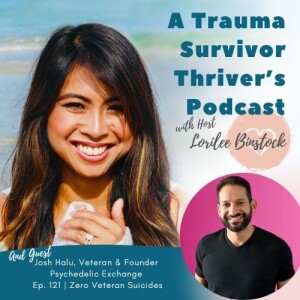
Thursday Apr 18, 2024
Zero Veteran Suicides
Thursday Apr 18, 2024
Thursday Apr 18, 2024
Thank you for joining us for a A Trauma Survivor Thriver’s Podcast now on Mental Health News Radio Network. This podcast is also available wherever you get your podcasts but I do suggest checking out Mental Health News Radio Network to find all your podcasts related to mental health.
Today’s guest is Josh Halu, Founder of The Psychedelic Exchange (PsycheX) - Josh is also a West Point graduate and former Army Officer, with a massive mission that's near and dear to his heart - zero veteran suicides. psycheX is blending groundbreaking psychedelic therapies with traditional mental health care, offering fresh hope and innovative solutions.
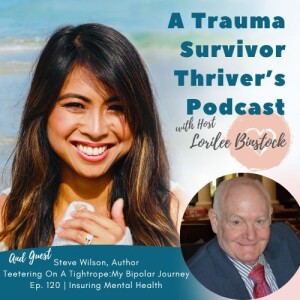
Thursday Apr 11, 2024
Insuring Mental Health
Thursday Apr 11, 2024
Thursday Apr 11, 2024
Thank you for joining us for a A Trauma Survivor Thriver’s Podcast now on Mental Health News Radio Network. This podcast is also available wherever you get your podcasts but I do suggest checking out Mental Health News Radio Network to find all your podcasts related to mental health.
Today’s guest is Steve Wilson. Steve is the Author of "Teetering On A Tightrope, my bipolar journey," Steve has helped over 1000 people facilitating mental health programs and raising awareness of mental health and the inadequacy of government programs and the damage done by insurance companies when providing mental health care.
